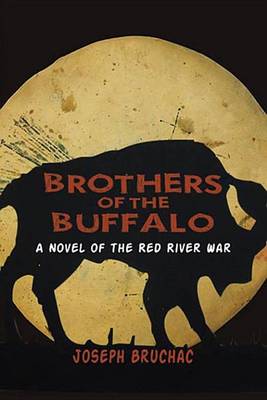Reviewed by readingwithwrin on
"White men's promises were as empty of weight as the wind.""Your people," Little Robe said to Miles, "make big talk. They make war if an Indian kills a white man's ox to keep his wife and children from starving. What do you think my people should do? How should they act when they see our buffalo killed by such men as those buffalo hunters who are not even hungry?"
This book without a doubt will be on my top books of 2017.
Washing and Wolf are two characters that while having very different upbringings and lives now, are similar in a lot of ways when it comes to how they view certain things.
While Washington who was once a former slave and is now free after the civil war and is now enlisted as a cavalry man (buffalo soldier). In the army he thought he was going to see the west, instead his division ends up waiting around most of the time and making sure the Indian's don't go outside of the reservation. Which after awhile he starts seeing a problem with because of the way the Indian's are being treated.
"The prospect of shooting Indians was no longer thrilling. He'd come to see them as men, not faceless enemies. He now found more sympathy in his heart for their Indians than for the buffalo hunters."
Then we have Wolf who is Cheyenne and is really struggling with what he should do, does he continue on with the ways of the tribe, or does he try and do what the government is trying to force the Indians into. He knows that the Indian's livelihood is being taken away due to buffalo killers who are hunting illegally, but the government never tries to stop them. So then the Indians were forced to go into the forts and live there all while having to give up everything they've ever known just in order to get food and warmth.
"To help the people. That is what I want more than anything else. I want to help our people survive."
The way that this story was put together, made it work for both of these characters and their stories. I never found myself enjoying one more than the other. When the characters did meet every so often it made me smile, because of the respect they seemed to give each other from a far.
I also really enjoyed the Indian stories that were told at the end of each chapter, they helped me understand more so how the Indian's were taught to believe certain things and how they thought the world worked.
" In some ways, a Buffalo Soldier, despite the fact he wore the uniform of the United States Army, was closer to the Indians than the white men- who despised them."
As for the representation of each of the characters, I don't honestly know much. I feel like at least Wolf's representation was pretty good, because the author is American Indian and has done a lot of activism and storytelling for them. I don't know how good his representation is for Washington's part of the story is though, so if you know anything about that please let me know.
Overall I feel like this is a must read for 2017 considering what's been going on with the pipelines in South Dakota and just how American Indian's are still treated in general as well.
Blog Twitter Instagram
Reading updates
- Started reading
- 15 February, 2017: Finished reading
- 15 February, 2017: Reviewed
